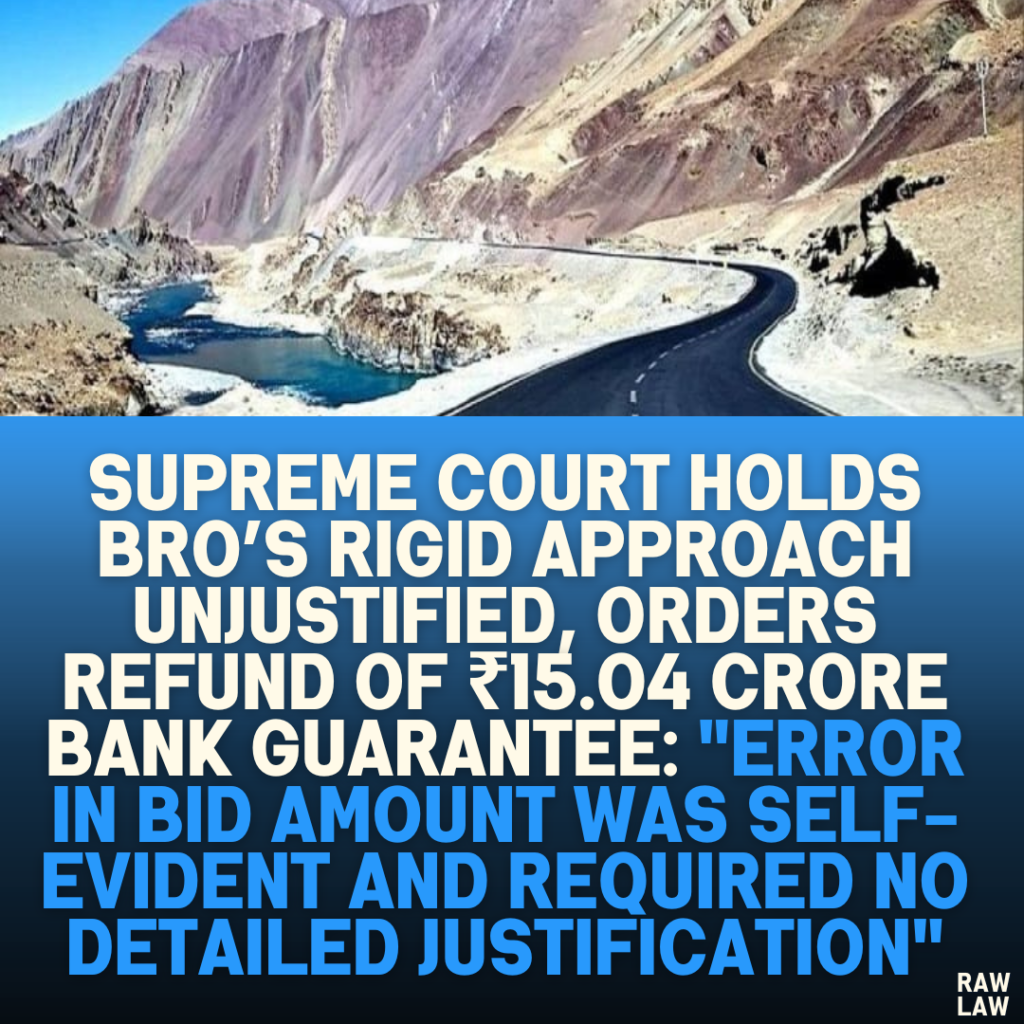Court’s Decision
The Supreme Court overturned the Himachal Pradesh High Court’s judgment, allowing the appellant’s appeal. It ruled that the Border Roads Organisation (BRO) should refund the appellant’s ₹15.04 crore bank guarantee upon the appellant paying ₹1 crore as a consequence of the error. The Court stated that the error in the bid amount was “self-evident,” requiring no detailed arguments to establish its absurdity, and criticized BRO’s inflexible approach, which prolonged the matter unnecessarily. The Court emphasized that pragmatic solutions to errors, particularly those that are apparent, should prevail over rigid legalism.
Facts of the Case
- On 23.02.2023, the Border Roads Organisation (BRO) invited tenders for the construction of twin tunnels at Shinkun La Pass to connect the Darcha-Padam Highway in Himachal Pradesh and Ladakh. The estimated project cost was ₹1,504.64 crores, with a completion deadline of 48 months.
- Ten bidders, including the appellant, submitted technical and financial bids. The appellant provided a bid security of ₹15.04 crores in the form of a bank guarantee.
- During the financial bid opening on 24.08.2023, the appellant was declared the lowest bidder (L1) with a quoted price of ₹1,569. However, the appellant clarified that this amount was erroneous and that the intended bid was ₹1,569 crores. The error was attributed to a typographical or technical issue.
- The appellant promptly informed BRO on 25.08.2023, explaining the mistake and requesting withdrawal from the tender process.
- Despite this, BRO treated the erroneous bid as valid and insisted the appellant justify the bid by submitting additional details. BRO eventually declared the appellant a defaulter, encashed the bank guarantee of ₹15.04 crores, and initiated a fresh tender process.
- Aggrieved, the appellant filed a writ petition before the Himachal Pradesh High Court, which was dismissed on 07.10.2023, leading to the current appeal before the Supreme Court.
Issues Raised
- Was BRO justified in treating the erroneous bid of ₹1,569 as valid?
- Did the appellant’s typographical error warrant the forfeiture of the ₹15.04 crore bank guarantee?
Petitioner’s Arguments
- The appellant argued that their bid of ₹1,569 was a typographical error, as it was absurd to quote such a nominal amount for a large-scale project valued at over ₹1,500 crores.
- They contended that the error was self-evident, requiring no further analysis, and that they had promptly informed BRO of the mistake the very next day (25.08.2023).
- The invocation of the bank guarantee was deemed unwarranted and disproportionate, as the error was genuine, unintentional, and quickly acknowledged.
Respondent’s Arguments
- BRO maintained that the appellant’s bid of ₹1,569 was valid as submitted, and their failure to honor the bid terms justified forfeiture of the bank guarantee.
- It argued that the delays caused in reissuing the tender and awarding the contract were attributable to the appellant’s mistake.
- BRO claimed that it had acted within its rights under the tender conditions.
Analysis of the Law
- The Court examined Section 20 of the Indian Contract Act, 1872, which renders agreements void in cases of mutual mistakes of fact essential to the agreement. However, it noted that this case involved a unilateral mistake and did not fall within the ambit of Section 20.
- Referring to West Bengal State Electricity Board v. Patel Engineering Co. Ltd., the Court noted that equitable relief could be granted where a material mistake is apparent, and the bidder promptly informs the authority of the error before any formal contract is entered into.
- The Court highlighted the principle of proportionality, emphasizing that administrative actions should balance accountability with fairness and equity. This principle ensures that punitive actions, such as forfeiture of security deposits, are not imposed disproportionately to the error.
Precedent Analysis
- West Bengal State Electricity Board v. Patel Engineering Co. Ltd.: Relief was denied where the error was not apparent and the bidder delayed rectifying the mistake.
- M/S Omsairam Steels & Alloys Pvt. Ltd. v. Director of Mines and Geology: Relief was granted where the mistake was evident, and equity demanded intervention.
- Coimbatore District Central Cooperative Bank v. Coimbatore District Central Cooperative Bank Employees Association: The doctrine of proportionality was applied to evaluate administrative penalties.
The Court distinguished the present case by emphasizing that the error in quoting ₹1,569 for a ₹1,500-crore project was glaring and did not require any detailed justification.
Court’s Reasoning
- The Court stated that BRO’s rigid approach to treating the bid as valid, despite knowing it was a mistake, was flawed and contributed to unnecessary delays.
- It emphasized that the error was self-evident, as it was absurd to execute a large-scale infrastructure project for a nominal amount like ₹1,569.
- The Court criticized BRO’s failure to take a practical and corrective approach, which could have resolved the issue without forfeiting the bank guarantee or delaying the project.
- It noted that delays in the reissued tender process were not entirely attributable to the appellant. The reissued tender resulted in awarding the contract at ₹1,290 crores, lower than the appellant’s originally intended bid of ₹1,569 crores, benefitting BRO.
Conclusion
The Supreme Court allowed the appeal, setting aside the High Court’s judgment. It directed:
- The appellant to pay ₹1 crore to BRO as a consequence of their error.
- BRO to refund the bank guarantee of ₹15.04 crores within one week of receiving the payment.
Implications
- The judgment reinforces the need for proportionality and fairness in administrative decision-making, particularly in cases involving apparent mistakes in public contracts.
- It emphasizes the importance of pragmatic approaches in resolving contractual disputes to avoid unnecessary litigation and delays.
- It serves as a precedent for granting equitable relief where errors are self-evident and promptly acknowledged by the affected party.
